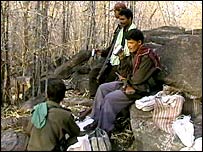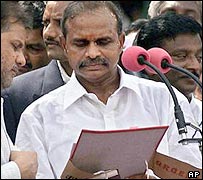|
By Omer Farooq
BBC correspondent in Hyderabad
|


The Maoists say the authorities have not kept
their
promises |
Maoist
rebels in the Indian state of Andhra Pradesh have rejected the state
government's request for them to discuss surrendering their arms.
Their rejection of the proposal is yet another setback to peace
talks between the rebels and the state government.
The state's chief minister said the peace process could not
continue unless the rebels' weapons were handed in.
Last month the Maoists said they were unhappy with the outcome of
the first round of talks with the government.
Modalities of surrender
In a letter to the authorities, Maoist leaders of the Communist
Party of India made it clear that issues such as economic self
reliance, land re-distribution and the democratic rights of the
people were more important than surrendering arms.
They accused the government of stalling the peace process, and
raising the issue of arms surrender even though they had earlier
promised to hold talks without any preconditions.

The state government insists the rebels must
lay down their arms |
The chief minister of Andhra Pradesh, YS Rajashekhar Reddy, said
on Sunday that his government would invite Maoist leaders for a
second round of talks but they would have to be prepared to discuss
the modalities of surrendering their arms.
He had said that peace was the ultimate purpose of talks, and
that could not be achieved unless the rebels gave up weapons.
The government's latest stand is in sharp contrast to the
position it took before the talks began: then the surrender of arms
and the terms of a ceasefire did not figure in the agenda.
The rebels have maintained from the outset that they will not
give up their armed struggle.
Dissatisfied
Analysts say the deadlock could seriously jeopardise the peace
process, which started this year after almost two decades violence
in the state.
Maoist rebels have been fighting since 1980 for the creation of a
communist state comprising the tribal areas in the states of Andhra
Pradesh, Maharashtra, Orissa, Bihar and Chhattisgarh.
More than 6,000 people have died in violence over the past two
decades.
A ceasefire has been in place for the past five months following
the election in Andhra Pradesh of a Congress party government.
The rebels said they were dissatisfied with the outcome of the
first round of talks with the government.
It was the first time that armed Maoist leaders came out of their
jungle hideouts for the face-to-face talks.